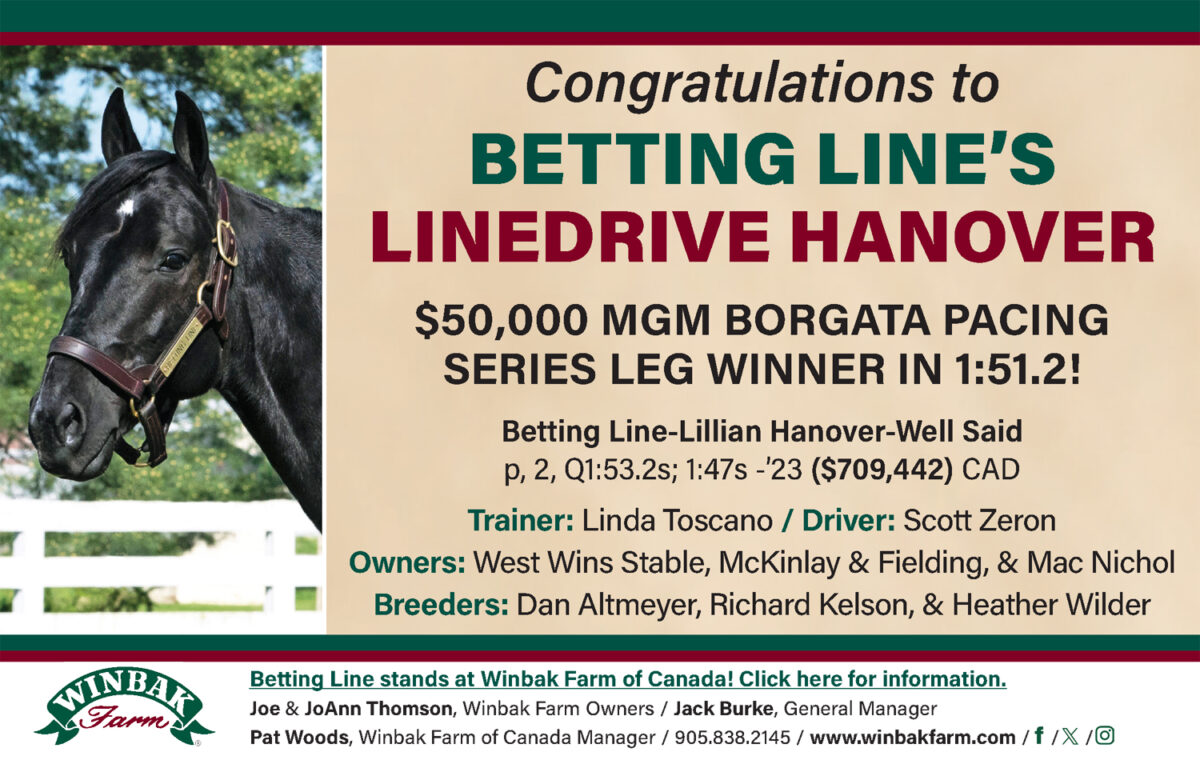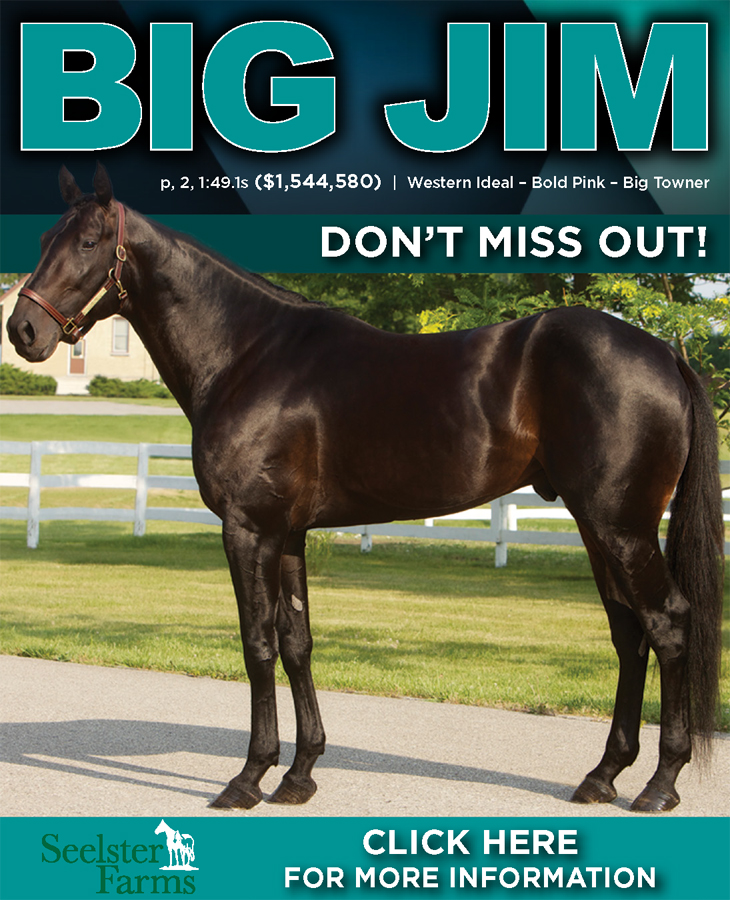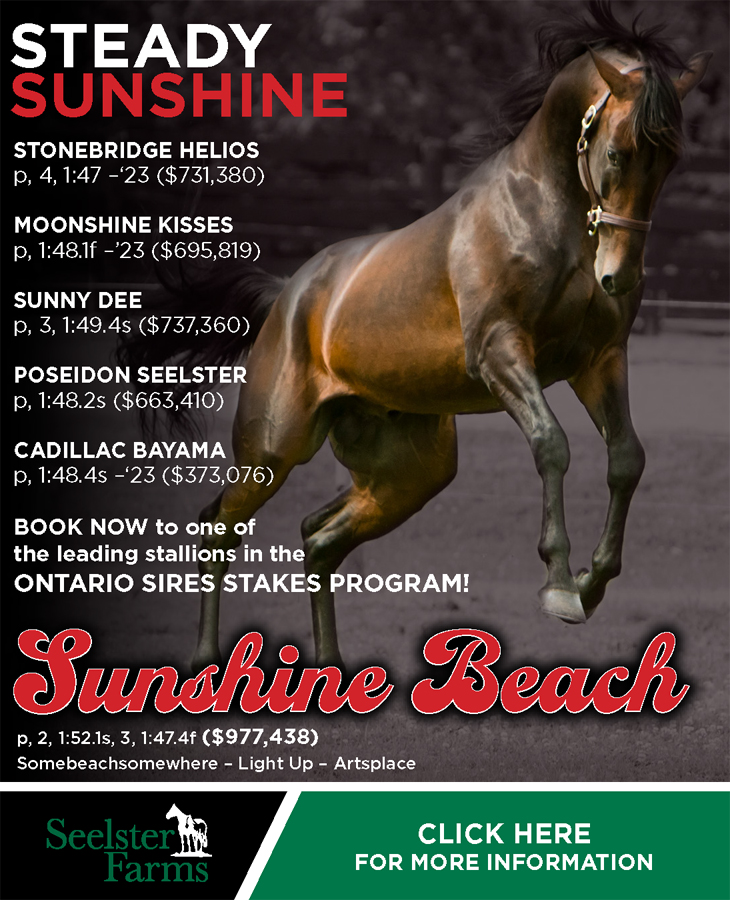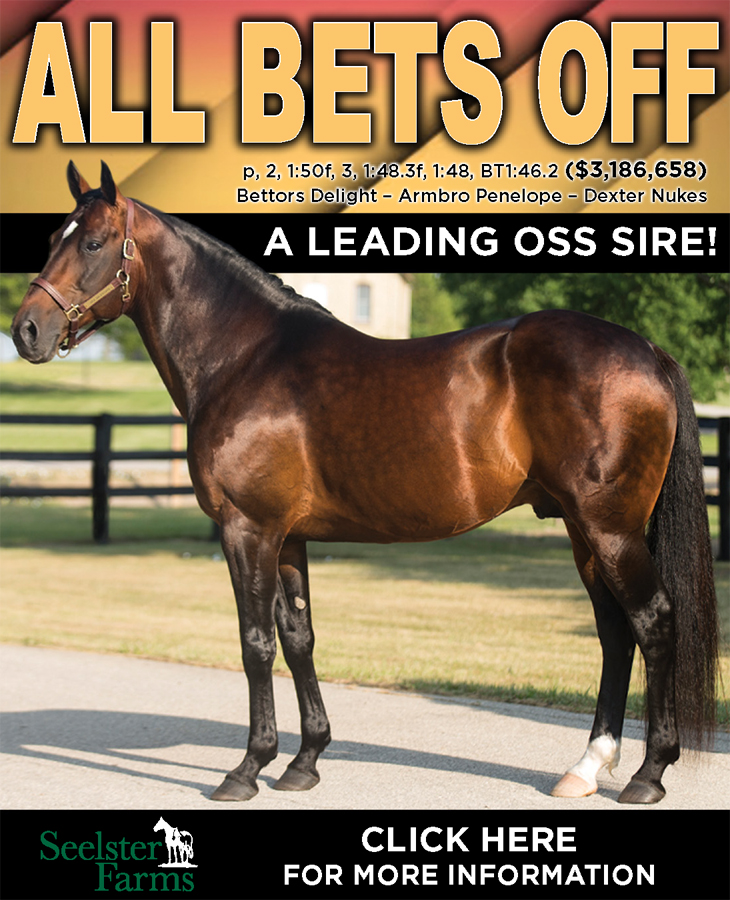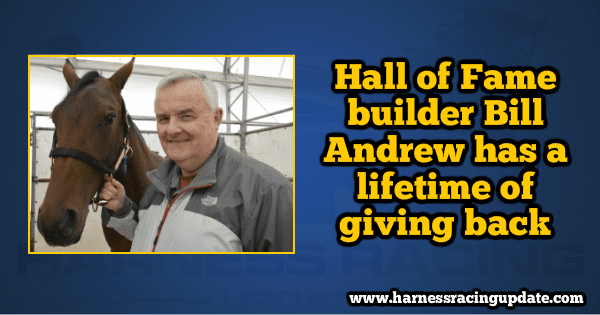

Charity a key component to Bill Andrew’s Hall of Fame career
The man who operates Meridian Farms East and West in Prince Edward Island and Alberta, respectively, will be inducted as a builder to the Canadian Horse Racing Hall of Fame.
by Melissa Keith
Bill Andrew is among the Canadian Horse Racing Hall of Fame’s newest inductees, chosen to enter the Builder category at the 2018 ceremony. The Alberta-based owner of Meridian Farms East and West could almost fit the Hall’s Communicator category as well, having advanced creative marketing ideas across mediums and borders.
Respect for tradition is the common denominator in Andrew’s work as standardbred breeder and philanthropic promoter of harness racing, even as his engineering background leads him to seek real-world solutions to problems such as declining attendance, handle, and horse population.
One idea, “Racing for Charity”, was originally introduced as a collaborative effort with the Alberta Standardbred Horse Association’s Fred Gillis. “We were chatting at the racetrack, eight or nine years ago, just on the thought of, ‘How do we get community involved, or knowing that we’re even alive and conducting the sport?’” said Andrew, who admits to becoming disheartened when racing “started to really fall off the map” with the general public after its 1950s and ‘60s heyday.
Andrew’s loyalty to racing comes naturally. “We were bred into it,” he says of himself and his brother, Brian. “My grandfather was as close to a professional trainer/driver as you could get in the days that he did his thing, through the ‘30s and ‘40s and ‘50s. I remember watching him drive in the early ‘60s, and then he slowed down.”
Bill’s father, Erwin, worked for trainers in the Charlottetown, PEI area as a young man, but left to serve in the Royal Canadian Air Force during World War II. He continued in that career for more than two decades.
“He always had an interest in racing, but we went as fans,” said Bill. “If we happened to be stationed near a community that had a racetrack, we went.” That meant attending races at Sydney, NS and Goderich, ON, and spending several weeks each summer in PEI. “We would always end up at the racetrack one way or another, at Charlottetown or Summerside.”
While Bill did not become a trainer or driver, he assisted some high-profile Island horsemen in his youth. “During my last three years of high school, I was over at Glengyle Farms quite a bit with Roach and Dougie MacGregor. I used to help them go in with the truck, to race horses and paddock them.”
When Erwin Andrew retired in 1967, he purchased a farm in Milton, PEI. “He started to accumulate some broodmares,” said Bill, who noted that his father typically kept nine or 10 mares at a time on the 40-acre farm. “That was his interest — breeding. As my brother Brian got a little bit older, his primary interest was always training and driving. He got the genes direct from my grandfather, I guess, and I got my father’s genes.”
Bill went to Alberta in 1975, building a successful career as an engineer in the petroleum industry. He recently sold his company, Long Run Exploration, and now runs what he terms a “drop-in centre for young engineers and geologists and accountants who are out of work,” which offers pro bono employment resources from a Calgary office location.
He remembers attending some races in Calgary in the 1970s, but not becoming part of the backstretch community. On summer visits to the Maritimes with his wife, Denise, he would attend live races at PEI tracks and Truro Raceway, connecting with people in the industry. During the ‘80s and early ‘90s, he bought racehorses from Ontario and Maine to race in the Maritimes in partnership with his father and brother. They also raced “the odd homebred.”
A co-worker of Bill’s wife was interested in racing, so Andrew ended up buying horses with him, which led to starting a “mostly solo” racing stable in the early ‘90s. Meridian Farms arose almost accidentally, adds Bill. “I think it happens to a lot of people: You race a nice filly, they take a bad step on the racetrack or something, and you get into the breeding business that way.” Class Pays, who was among the first yearlings he bought, came down with lung-damaging pneumonia after earning around $100,000 racing at two and three. She became a foundation broodmare.
In the late ‘90s, Andrew purchased Glengyle Farm in PEI from the widow of Roach MacGregor. At the time, he bought it because the house on the property was ideally suited to the needs of his aging father. The land and stables now comprise the headquarters of Meridian Farm East, which is currently working to rebuild Maritime trotting stock with 10 trotting broodmares and two of the region’s top two trotting sires, Tad The Stud and Armbro Barrister.
“We got going a little harder on the racing and breeding side, and at the same time, out here,” said Bill of concurrent expansions at Meridian Farms East and West. He credits fellow Islander Terry McIsaac with helping grow the Alberta operation. “He has been such a good farm manager for us that we developed a name in the breeding industry out here.”
Meridian Farms finished 46th in the list of the top 50 North American breeders last year (individual, by wins), with 36 winners from 54 starters in 2017 recording a collective 126 seasonal wins and $650,210 (US) in earnings. Meridian did not make the top 50 breeders by earnings, a fact largely attributable to Andrew’s personal commitment to rebuilding racing stock in two regions with relatively low purses and few races, plus the low Canadian dollar.
Andrew’s impending Hall of Fame induction, like his 2015 Cam Fella Award, is based upon more than his indisputable contributions as a breeder.
When “Racing for Charity” debuted in Alberta, it was based on a concept he and Fred Gillis devised: a racehorse was donated to fundraise for regional non-profits and local branches of larger organizations. “I think the first year we brought in seven or eight different charities, which ranged from a Boys and Girls Club to a volunteer fire department, and everything in between,” he said. Andrew provided the original horse, Starring Role. “She raced in the mares open; heck, she raced in the open pace — that’s the quality we had racing for charity! We guaranteed (selected charities) ‘x’ dollars a month, and then if the horse did better than that, they got a little more.”
For nearly a decade, Meridian has continued the concept, with “Fun for Fans” the current Alberta version of “Racing for Charity”. It has been financially self-sustaining for the past few years, with all profits after equine upkeep going toward worthwhile causes. Starring Role is now a part of the Meridian West broodmare band. Maritime editions of the fundraising have also proven successful in attracting racegoers, plus goodwill from community leaders, including — importantly, notes Andrew — politicians.
Not one to seek the spotlight, Andrew is most satisfied in knowing his work has helped others and the industry. He tells HRU the best comment he and Gillis ever received on their charitable racing efforts came from the fire chief in Lacombe, AB. “We raced for a few years in Lacombe, when we were waiting for the Calgary track to get built, and he said, ‘Before you guys came to Lacombe, I always thought of the racing industry as a bunch of people who take — takers. Now I know that you’re givers.’”
With future plans beyond the scope of this article, suffice it to say that Bill Andrew will continue to make his mark as a Builder long after he is formally recognized as one on Aug. 8 at the Mississauga Convention Centre.







